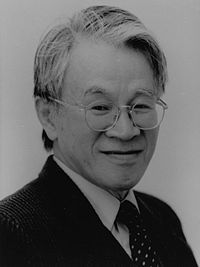- Michio Morishima
-
Michio Morishima 
Born July 18, 1923 Died July 13, 2004 (aged 80) Nationality  Japan
JapanInstitution London School of Economics
Osaka UniversityField Econometrics Alma mater Kyoto University Influenced Christopher A. Pissarides Michio Morishima (森嶋 通夫 Morishima Michio, July 18, 1923 – July 13, 2004) was a Japanese economist, mathematician and econometrician, who was a faculty member at the London School of Economics from 1970-88 as the Sir John Hicks Professor of Economics. He was also emeritus professor of Osaka University and a member of the British Academy.
He was a recipient of the Order of the Rising Sun, the highest civilian honour of Japan.
He studied economics and sociology under Yasuma Takada.In 1946 he graduated Kyoto University and taught at Kyoto University and Osaka University. And he established Institute of Social and Economic Research (ISER) of Osaka University with Yasuma Takada. In 1968, he went to Britain and taught at University of Essex, LSE.
In 1965, he became the first Japanese president of the Econometric Society. It is said that the most enthusiastic supporter of Morishima was John Hicks.
He was the originator of the project that resulted in the establishment of the Suntory-Toyota Foundation and the Suntory and Toyota International Centres for Economic and Related Disciplines (STICERD) at LSE. He was STICERD's first chairman. In 1991 he was elected an Honorary Fellow of the LSE.[1]
Contents
Research
His principal interests were in general equilibrium theory, the history of economic thought, and capitalist economic systems. Morishima's economic theory worked towards the accommodation of von Neumann's 1937 multi-sectoral growth model to a general equilibrium model. His research reviewed the works of Marx and Walras. Considering the work of these theorists to be Ricardian, his research worked to show that the modification of them along von Neumann lines elucidates the theoretical similarities and differences between the positions.
His publications included Equilibrium, Stability and Growth (1964), Theory of Economic Growth (1969), Marx's Economics (1973), The Economic Theory of Modern Society (1976), Why has Japan 'succeeded'? (1982), and The Economics of Industrial Society (1984).
Education
1946 graduated Faculty of Economics, Kyoto University
Professional experience
- 1948 - Assistant at Kyoto University
- 1950 - Lecturer at Kyoto University
- 1950 - Assistant professor at Kyoto University
- 1951 - Assosiate professor at Osaka University
- 1963 - Professor of Economics at Osaka University
- 1966 - Professor of ISER (Institute of Social and Economic *Research) at Osaka University
- 1968 - Visiting professor at University of Essex
- 1969 - Keynes visiting professor at University of Essex
- 1970 - Professor at London School of Economics
- 1982 - Sir John Hicks professor at London school of Economics
Publications
Major works of Michio Morishima
- "On the Laws of Change of the Price System in an Economy which Contains Complementary Goods", 1952, Osaka EP.
- "Consumer Behavior and Liquidity Preference", 1952, Econometrica.
- "An Analysis of the Capitalist Process of Reproduction", 1956, Metroeconomica.
- "Notes on the Theory of Stability of Multiple Exchange", 1957, RES.
- "A Contribution to the Non-Linear Theory of the Trade Cycle", 1958, ZfN.
- "A Dynamic Analysis of Structural Change in a Leontief Model", 1958, Economica.
- "Prices Interest and Profits in a Dynamic Leontief System", 1958, Econometrica.
- "Some Properties of a Dynamic Leontief System with a Spectrum of Techniques", 1959, Econometrica.
- "Existence of Solution to the Walrasian System of Capital Formation and Credit", 1960, ZfN.
- "On the Three Hicksian Laws of Comparative Statics", 1960, RES.
- "A Reconsideration of the Walras-Cassel-Leontief Model of General Equilibrium", 1960, in Arrow, Karlin and Suppes, editors, Mathematical Methods in the Social Sciences.
- "Economic Expansion and the Interest Rate in Generalized von Neumann Models", 1960, Econometrica.
- "Proof of a Turnpike Theorem: The `No Joint Production' Case", 1961, RES.
- "Aggregation in Leontief Matrices and the Labor Theory of Value", with F. Seton, 1961, Econometrica.
- "Generalizations of the Frobenius-Wielandt Theorems for Non- Negative Square Matrices", 1961, J of London Mathematical Society.
- "The Stability of Exchange Equilibrium: An alternative approach", 1962, IER.
- Equilibrium, Stability and Growth: A multi-sectoral analysis, 1964.
- "A Refutation of the Non-Switching Theorem", 1966, QJE.
- "A Few Suggestions on the Theory of Elasticity", 1967, Keizai Hyoron
- Theory of Economic Growth, 1969.
- "A Generalization of the Gross Substitute System", 1970, RES.
- "Consumption-Investment Frontier, Wage-Profit Frontier and the von Neumann Growth Equilibrium", 1971, ZfN.
- The Working of Econometric Models, (in collaboration with Y. Murata, T. Nosse and M. Saito), 1972.
- Marx's Economics: A dual theory of value and growth, 1973.
- Theory of Demand: Real and monetary, with co-authors, 1973.
- The Economic Theory of Modern Society, 1973.
- "The Frobenius Theorem, Its Solow-Samuelson Extension and the Kuhn-Tucker Theorem", with T. Fujimoto, 1974, JMathE.
- Walras's Economics: A pure theory of capital and money, 1977.
- Value, Exploitation and Growth, with G. Catephores, 1978.
- "The Cournot-Walras Arbitrage Resource Consuming Exchange and Competitive Equilibrium", with M. Majumdar, 1978, in Hommage a Francois Perroux. *Why Has Japan Succeeded? Western technology and the Japanese ethos, 1982.
- "The Good and Bad Uses of Mathematics", 1984, in Wiles and Routh, editors, Economics in Disarray.
- The Economics of Industrial Society, 1984.
- Ricardo's Economics, 1989.
- "General Equilibrium Theory in the 21st Century", 1991, EJ.
- Capital and Credit: A new formulation of general equilibrium theory, 1992.
- "Capital and Growth", 1994, in Homouda, The Legacy of Hicks.
- Dynamic Economic Theory, 1996.
- Why Will Japan Collapse?, 1999.
References
External links
Categories:- 1923 births
- 2004 deaths
- Japanese economists
- Historians of economic thought
- Kyoto University alumni
- Kyoto University faculty
- Osaka University faculty
- Academics of the University of Essex
- Academics of the London School of Economics
- Academics of the Open University
- Fellows of the British Academy
- Recipients of the Order of Culture
Wikimedia Foundation. 2010.
